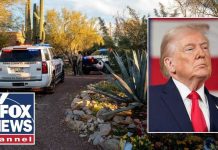
The threat to revoke broadcast licenses for critical TV networks is not just a political stunt—it’s a direct challenge to the foundations of American press freedom.
Story Snapshot
- Trump has publicly suggested revoking broadcast licenses for networks he views as hostile.
- FCC Chair Brendan Carr has echoed these threats, warning networks to self-censor or face regulatory scrutiny.
- The move follows the removal of Jimmy Kimmel’s show from ABC, which critics attribute to political pressure.
- Legal experts warn this could erode the independence of the FCC and undermine the First Amendment.
- The broader media landscape is now facing unprecedented pressure to align with political interests.
Political Pressure Meets Regulatory Power
The Trump administration’s latest move to threaten broadcast license revocation is a stark escalation in the ongoing battle between political power and media independence. By leveraging the FCC’s regulatory authority, the administration is signaling that networks critical of its agenda may face severe consequences. This is not a new tactic—President Nixon once tried similar pressure on the Washington Post during Watergate—but the current approach is more direct and far-reaching. The administration’s justification centers on alleged liberal bias and “fake news,” but critics argue this is a thinly veiled attempt to silence dissent.
The removal of Jimmy Kimmel’s show from ABC, officially attributed to poor ratings, is widely seen as a result of political pressure. This sets a precedent for how regulatory agencies can be used to influence media content. The FCC’s role is supposed to be independent, but with its chair appointed by the president, there is a clear risk of politicization. The administration’s actions are not just about punishing individual shows or hosts—they are about reshaping the entire media landscape to align with political interests.
Legal and Constitutional Implications
The First Amendment protects press freedom, but broadcast licenses are subject to FCC regulation, creating a legal gray area. Former FCC Chair Tom Wheeler has stated that the FCC does not have the authority to revoke a license based on a particular newscast. Current FCC Chair Jessica Rosenworcel has also emphasized that the First Amendment is a cornerstone of democracy and that the FCC will not revoke licenses simply because a political candidate disagrees with content. However, the administration’s actions are testing the limits of these protections, and legal challenges are likely to follow.
The broader implications for press freedom are significant. If networks are forced to self-censor to avoid regulatory retaliation, the public loses access to diverse and independent media. This erosion of press freedom could have long-term damage to democratic institutions. Legal scholars and political scientists warn that the politicization of regulatory agencies undermines the credibility of both the media and the government.
Impact on Media and Public Trust
The media landscape is already highly polarized, with networks often accused of bias by both political sides. The administration’s actions are likely to increase self-censorship and further politicize media content. Networks may alter programming and editorial decisions to avoid regulatory pressure, leading to a more homogenized and less independent media environment. This could erode public trust in media and democratic institutions, as people lose confidence in the ability of the press to provide unbiased information.
The economic impact on networks is also significant. Regulatory pressure and public backlash could lead to loss of advertising revenue and viewership. Journalists and hosts face professional and personal risks, and the broader industry may see increased alignment with political interests to avoid regulatory scrutiny. The long-term damage to press freedom and democratic norms could be profound, with lasting effects on the media landscape and public trust.
Sources:
Trump Floats Stripping Networks Critical of Him of Their Broadcast Licenses
Donald Trump Has Threatened to Shut Down Broadcasters, But Can He?









